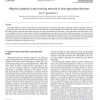7486 search results - page 35 / 1498 » The Limits of Quantum Computers |
FOCS
2009
IEEE
14 years 18 days ago
2009
IEEE
Coin flipping is a fundamental cryptographic primitive that enables two distrustful and far apart parties to create a uniformly random bit [Blu81]. Quantum information allows for ...
COMPUTER
2002
13 years 8 months ago
2002
wever, by using a simple model of abstract building blocks: quantum bits, gates, and algorithms, and the available implementation technologies--in all their imperfections.7 The bas...
TCC
2004
Springer
14 years 2 months ago
2004
Springer
Quantum 2-party cryptography differs from its classical counterpart in at least one important way: Given blak-box access to a perfect commitment scheme there exists a secure 1−2...
SCL
2010
13 years 7 months ago
2010
In this paper, we put forward a fundamental question concerning feedback control of quantum systems: Is measurement-based feedback control still better than openloop control? In c...
BIOSYSTEMS
2008
13 years 8 months ago
2008
The world's objective pattern is formed through consistent histories of quantum measurements originating as different branches of the same wave function. When we come close t...

